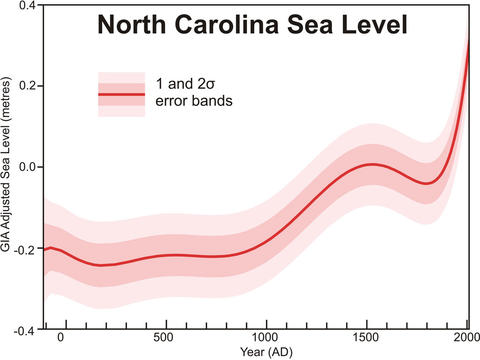See the Sea. See the Sea Level. See the Sea Level Rise.

Graph showing sea level rise along North Carolina coast, adapted from Kemp et al, via Skeptical Science
"From Cape Hatteras, N.C. to just north of Boston, sea levels are rising much faster than they are around the globe," reports Seth Borenstein of the Associated Press:
Along the region, the Atlantic Ocean is rising at an annual rate three times to four times faster than the global average since 1990 ... It's not just a faster rate, but at a faster pace, like a car on a highway "jamming on the accelerator," said the study's lead author, Asbury Sallenger Jr., an oceanographer at the [United States Geological Survey] ... By 2100, scientists and computer models estimate that sea levels globally could rise as much as 3.3 feet. The accelerated rate along the East Coast could add about 8 inches to 11 inches more, Sallenger said. "Where that kind of thing becomes important is during a storm," Sallenger said. That's when it can damage buildings and erode coastlines."
Any pragmatic, concerned local authorities along the eastern seaboard would be looking to prepare for the worst-case-scenario, surely? Wellll, not so much, especially in North Carolina.
The ongoing discussion in the Tar Heel State to legislate away sea-level rise has been well documented over the past couple of weeks (Cliff Notes version: Some state lawmakers want to ban coastal planners from using scientific models that show accelerated rises in sea level), and has even been the target of primetime televised mirth:
At least the state House last week rejected a bill passed by the Senate, which would have forbidden the use of accelerated sea-level rise predictions in coastal planning. Not that the story is necessarily over: some lawmakers countered that they might instead float the idea of a five-year moratorium, rather than an outright ban, pending a review of the available science.
It is to the misfortune of the wish-it-all-away members of the North Carolina legislature that the Raleigh-Durham-Chapel Hill Research Triangle is home to several individuals and institutions with a knowledgeable focus on ocean issues, several of whom are more social-media savvy than the average bear. The folks at Southern Fried Science, for example, posted a short explanation of precisely why a linear extrapolation of sea level rise trends, as advocated by supporters of the Senate bill, is the absolute least reliable predictor of future changes. The man who has really been pounding away at the issue, though, is UNC's John Bruno, via his SeaMonster blog. John has a summary of the state-sponsored scientific report on sea-level rise that sparked the frenzy, rebuts an attempted rebuttal of the scientific arguments against the Senate bill, and is posting regular updates on the legislation's progress or lack thereof, of which this is the latest.
Add a comment